
Houd je van klassieke talen? Wil je weten hoe mensen in de klassieke oudheid leefden en hoe dit onze cultuur heeft beïnvloed? Groningen laat de oudheid spreken!
In deze bacheloropleiding verdiep je je in het Grieks én
het Latijn. Daarnaast bestudeer je de cultuur van de oudheid en het
belang hiervan voor onze moderne cultuur.
De opleiding in Groningen onderscheidt zich door Grieks en Latijn
aan te bieden in combinatie met de cultuurvakken Oude Geschiedenis,
Archeologie en Antieke Wijsbegeerte. Zo bestudeer je de context
waarin antieke teksten zijn ontstaan en de wisselwerking tussen
taal, literatuur, politiek, maatschappij en antieke denkkaders.
Daarnaast kijk je hoe de klassieke oudheid doorwerkt in latere
perioden, zoals de middeleeuwen en de renaissance.
In het eerste jaar bestudeer je onderwerpen als grammatica, drama,
proza, literatuurgeschiedenis en krijg je een inleiding in de drie
cultuurvakken. In het tweede jaar ga je door met epos, lyrische
poëzie, taal- en literatuurwetenschap en begin je aan
onderzoekscolleges, waarin ook een excursie opgenomen is. In het
derde jaar volg je een minor, heb je onderzoekscolleges Grieks en
Latijn en schrijf je een scriptie.
Je kunt deze studie zowel in voltijd als deeltijd doen.
Het eerste jaar van je bachelor ontwikkel je je taalvaardigheid zo goed dat je Grieks en Latijnse teksten zelfstandig en redelijk vlot kunt lezen en vertalen. Je begint ook al met het lezen van grote auteurs als Euripides, Plato en Cicero. Ook krijg je een goede basiskennis van de oude geschiedenis, archeologie en filosofie van de oudheid.
| Semesters | ||||
|---|---|---|---|---|
| VakkenVakkencatalogus > | 1a | 1b | 2a | 2b |
| Inleiding op de Oud-Griekse wereld (5 EC) | ||||
| Griekse taalvaardigheid (10 EC) | ||||
| Latijnse taalvaardigheid (10 EC) | ||||
| Overgangsmodule Grieks of Latijn* (10 EC, keuzevak) | ||||
| Inleiding op de Romeinse wereld (5 EC) | ||||
| Classical Worlds and the Making of Heritage (10 EC) | ||||
| Griekse Lectuur 1 (10 EC) | ||||
| Latijnse Lectuur 1 (10 EC) | ||||
In het tweede en derde jaar heb je voldoende taalvaardigheid opgedaan om dieper op de inhoud van de teksten in te gaan. In het tweede jaar lees je epiek (o.a. Homerus en Vergilius) en geschiedschrijvers, zoals Herodotus en Tacitus. Dat doe je in combinatie met het bestuderen van inscripties en papyri, die een andere bron vormen om geschiedenis te leren kennen.
| Semesters | ||||
|---|---|---|---|---|
| VakkenVakkencatalogus > | 1a | 1b | 2a | 2b |
| Griekse Lectuur 2 (10 EC) | ||||
| Keuze uit een reeks faculteitsbrede vakken (10 EC) | ||||
| Latijnse Lectuur 2 (10 EC) | ||||
| Onderzoekscollege Oude Geschiedenis en Archeologie (inclusief een excursie naar Italië of Griekenland) (10 EC) | ||||
| Epigrafie en papyrologie (5 EC) | ||||
| Griekse en Latijnse poëzie-analyse: Van hymne tot satire (5 EC) | ||||
| Choice from a range of faculty-wide courses (10 EC) | ||||
| Historiografie in de Oudheid (5 EC) | ||||
| Onderzoekscollege Antieke Wijsbegeerte (5 EC) | ||||
In het derde jaar is het eerste semester gereserveerd voor de minor. Een minor is een samenhangend pakket vakken, dat je helpt je studie te verbreden en/of je voor te bereiden op een masterstudie of de arbeidsmarkt. In het tweede semester volg je onderzoekscolleges en schrijf je je bachelorscriptie.
| Semesters | ||||
|---|---|---|---|---|
| VakkenVakkencatalogus > | 1a | 1b | 2a | 2b |
| Minor (30 EC) | ||||
| Onderzoekscollege Grieks (5 EC) | ||||
| Bachelorscriptie (10 EC) | ||||
| Onderzoekscollege Latijn (5 EC) | ||||
Per 2026-2027 wijzigt het vakkenaanbod van deze opleiding. In het najaar van 2025 wordt hierover meer bekend.
| Programma-opties |
|---|
| Minoren (minor) Het vijfde semester besteed je aan je minor: een pakket samenhangende vakken dat toekomstgericht is. Het bereidt je voor op een vervolg in een mastertrack of op de arbeidsmarkt. Kies uit een careerminor, buitenlandminor, universitaire minor of facultaire minor. |
| University of Groningen Honours College (honoursprogramma) Het Honours College biedt talentvolle en gemotiveerde studenten de kans meer uit zichzelf te halen. Dat doe je door het volgen van een extra (honours)programma van 30 studiepunten, met verdiepende en verbredende modules, naast je reguliere bacheloropleiding van 180 studiepunten, en door tal van andere activiteiten die je samen met honoursstudenten van andere opleidingen onderneemt en organiseert. Ontwikkeling van talent en eigen initiatief zijn de uitgangspunten van het honoursprogramma van de RUG. |
Neem voor meer informatie over studeren in het buitenland contact op met de contactpersoon uitwisselingen van GLTC: studieadviseur drs. R.P. van der Borg (studieadviseur.gltc rug.nl).
met Latijn en/ of Grieks op eindexamenniveau
met Latijn en/ of Grieks op eindexamenniveau
met Latijn en/ of Grieks op eindexamenniveau
met Latijn en/ of Grieks op eindexamenniveau
| Specifieke eisen | Extra informatie |
|---|---|
| vooropleiding |
Voor de studenten die eindexamen hebben gedaan in óf Grieks óf Latijn (en dus niet in allebei), bestaat er de overgangsmodule voor de andere taal. Zij volgen in het eerste jaar een overgangsmodule in die taal in combinatie met de colleges Taalvaardigheid I en II. |
| overige toelatingseisen |
Taaleis Engels: een VWO diploma, een VWO deelcertificaat voor Engels (met een 6 of hoger), minimum TOEFL eis iBT 90 (met een minimum van 21 voor alle onderdelen), of IELTS 6.5 (met een minimum van 6 voor alle onderdelen) of Cambridge C1 Advanced of C2 Proficiency met een minimum score van 180. |
De opleiding verzorgt matching. Deelname is optioneel. Het advies is niet bindend.
De Faculteit der Letteren gaat er van uit dat jij, via een bezoek aan de Open dagen, deelname aan een Eén Dag student en/of aan een Webklas, jezelf goed hebt voorbereid op de opleiding van jouw keuze. Op basis van deze voorlichtingsactiviteiten bepaal jijzelf of je goed matcht met de opleiding.
Vragen over matching bij de Faculteit der Letteren? Hier kun je verdere informatie vinden: https://www.rug.nl/matching
| Type student | Deadline | Start opleiding |
|---|---|---|
| Nederlandse studenten | 01 mei 2026 | 01 september 2026 |
| EU/EEA studenten | 01 mei 2026 | 01 september 2026 |
| non-EU/EEA studenten | 01 mei 2026 | 01 september 2026 |
The Faculty of Arts believes students can decide for themselves whether they match with their chosen program based on the available bachelor program information, by visiting the Open Days, and by participating in a Webclass and/ or Student for a Day. If you are unable to attend one of these activities, a final opportunity for matching is to contact one of the students of the program in June.
If you have any further questions about matching, check out: https://www.rug.nl/matching
| Specifieke eisen | Extra informatie |
|---|---|
| vooropleiding |
Requirements for International diploma holders: see Admissions Guide. It contains the criteria for all International VWO equivalents: https://www.rug.nl/education/application-enrolment-tuition-fees/admission/procedures/application-informatie/with-non-dutch-diploma/entry-requirements/bachelor-entry-requirements/vwo-equivalent-qualifications Additionally, you will need to have passed your final exams in Greek and/or Latin, to satisfy the entry requirement. If you have not passed your final exams in Greek or Latin, you will take extra courses in Greek or Latin alongside Language Proficiency I and II. |
| taaltoets cijfer |
International students will have to satisfy an additional Dutch language requirement, which can be met by passing the State Examination in Dutch as a Second Language (NT2, programme II). This examination guarantees Dutch proficiency at CEFR level B2. However, Dutch proficiency at CEFR level C1 or higher is recommended. Additional language requirement English: A VWO diploma or a subject certificate for VWO English (mark 6 or higher), minimum requirement of TOEFL iBT 90 (with a minimum of 21 on all items), or IELTS 6.5 (with a minimum of 6 on all items) or Cambridge C1 Advanced or C2 Proficiency with a minimum score of 180. |
| Type student | Deadline | Start opleiding |
|---|---|---|
| Nederlandse studenten | 01 mei 2026 | 01 september 2026 |
| EU/EEA studenten | 01 mei 2026 | 01 september 2026 |
| non-EU/EEA studenten | 01 mei 2026 | 01 september 2026 |
Als je je universitaire opleiding voort wilt zetten door een master te volgen, zoals de meeste studenten doen, zijn er allerlei verschillende vervolgopleidingen waar je uit kunt kiezen. Mastertracks die aansluiten op de BA Griekse en Latijnse Taal en Cultuur zijn:
De laatste twee mastertracks bereiden je voor op respectievelijk een baan in het voortgezet onderwijs en in het onderzoek.
De breedheid van een Letterenopleiding, de grote taalvaardigheid en het kritisch en analytisch vermogen maken classici geschikt voor allerlei functies. Afgestudeerden komen terecht in het onderwijs of in de wetenschap. Daarnaast kun je staflid worden van een (wetenschappelijke) bibliotheek of van een museum (afhankelijk van je specialisatie). Verder komen afgestudeerden terecht in de journalistiek, bij uitgeverijen, bij de overheid, in het bedrijfsleven of in het culturele werk.
Het onderzoek van de stafleden van de opleiding Griekse en Latijnse Taal en Cultuur in Groningen bestrijkt alle aspecten van de oudheid: taalkunde en letterkunde Grieks en Latijn, antieke filosofie, klassieke archeologie en oude geschiedenis. Studenten hebben vaak de mogelijkheid om, bijvoorbeeld als studentassistent, aan dit onderzoek bij te dragen.
Studenten worden aangemoedigd om het CRASIS Ancient World Seminar bij te wonen; hier worden lezingen gehouden door internationaal vermaarde wetenschappers en vindt ontmoeting en discussie plaats tussen studenten en stafleden van alle opleidingen in Groningen die zich met de Oudheid bezig houden. Elke twee jaar wordt door onze stafleden de internationale Groningen Workshop on Hellenistic Poetry georganiseerd.
Zie voor meer informatie onze Engelstalige onderzoekspagina.
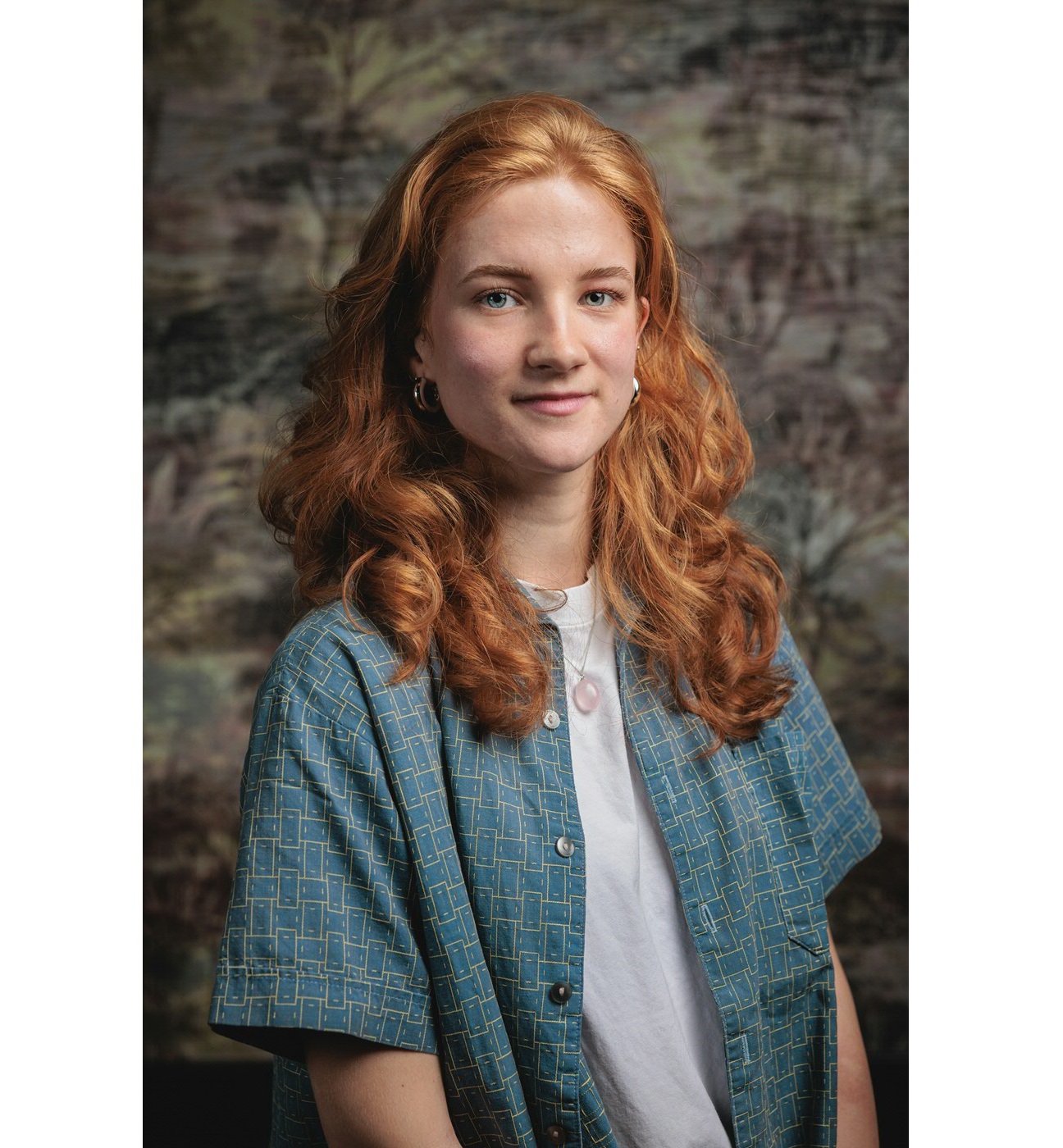
Hallo! Mijn naam is Sarah Elgersma, ik ben 20 jaar oud en ik ben tweedejaars studente Griekse en Latijnse taal en cultuur. Ik woon in Groningen en kom hier ook vandaan. Ik ben actief lid bij Boreas, de studievereniging van Grieks en Latijn, en heb in mijn eerste jaar als commissaris gediend in het bestuur. Naast de studie ben ik dol op lezen, sporten en mijn vrienden zien en ik heb ook nog een leuk baantje in de horeca!
Ik studeer Grieks en Latijn omdat Latijn op de middelbare school altijd een heel leuk vak heb gevonden. Ik ben dol op taal, maar ook op geschiedenis, kunst, cultuur en filosofie. Deze studie is daarom de perfecte combinatie van al mijn interesses. Ik ben naar meerdere open dagen geweest van de RUG en dit was de eerste studie die me echt aansprak. Om me verder voor te bereiden heb ik ook nog de webklas gevolgd en een meeloopdag gedaan, beide leuke manieren om je te oriënteren op een studie! Ik heb zelf op de middelbare school helemaal geen Grieks gehad. Ik ben er mee begonnen in mijn tussenjaar voorafgaand aan de studie, maar ik heb het grootste deel geleerd in het eerste jaar van de studie. Mocht je in één van de twee talen geen eindexamen gedaan hebben, komt dit zeker goed tijdens je studie!
Lees meer over Sarah en waarom zij ervoor koos om Griekse en Latijnse Taal en Cultuur te studeren in Groningen!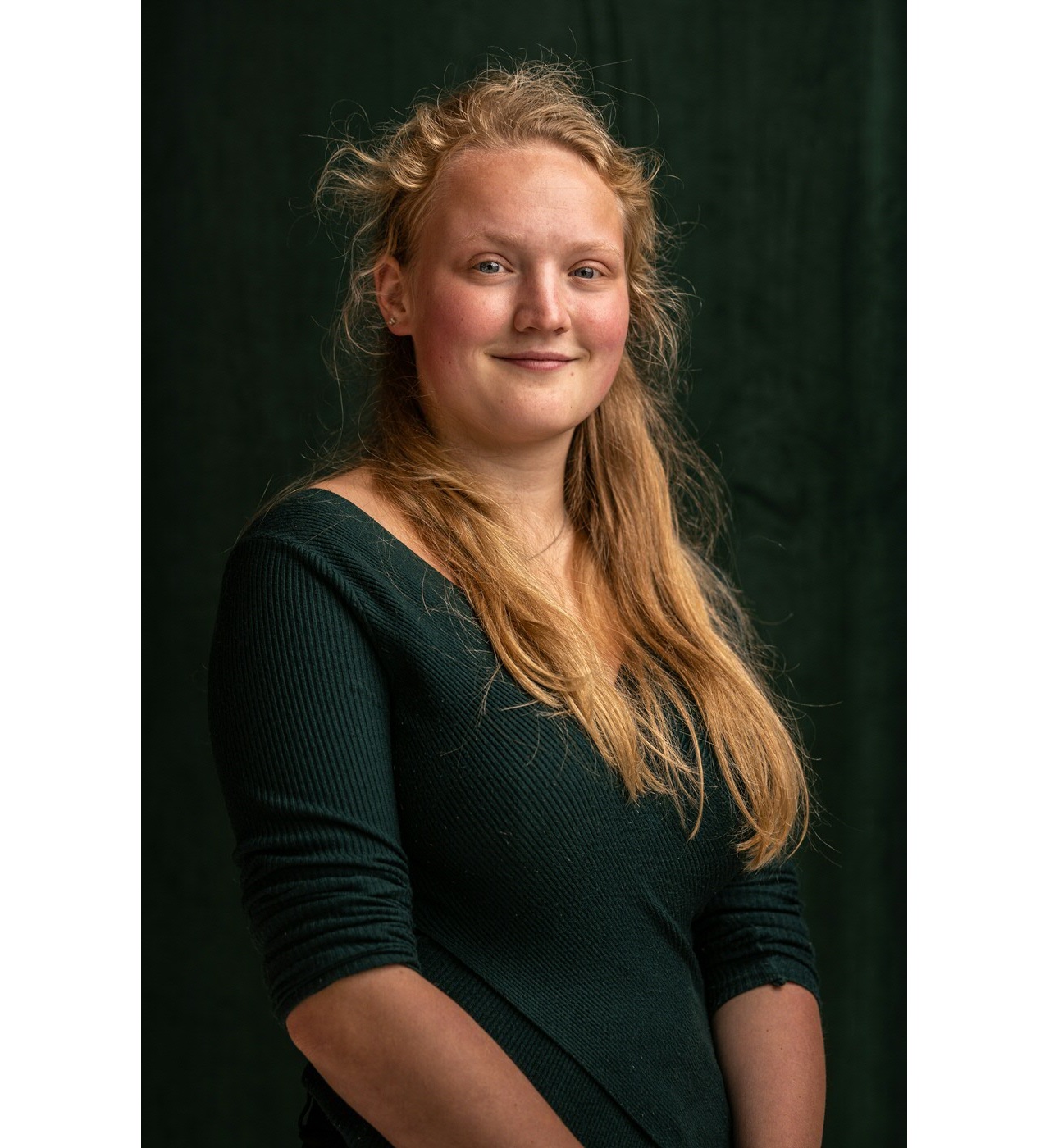
Hoi! Mijn naam is Pascalle van Setten, ik ben 20 jaar oud en zit nu in mijn vierde jaar van de bachelor Griekse en Latijnse Taal en Cultuur. Ik ben ook lid van studievereniging Boreas en heb een jaar gediend als secretaris. Ik woon sinds dit jaar in de stad, maar heb drie jaar vanuit Drenthe gereisd, dus ik ken de voor- en nadelen! Buiten school ben ik vaak met een verhaal bezig of heb ik een boek in mijn handen, maar ik spreek ook graag af met vrienden, loop lange rondes met mijn hond, en ik werk inmiddels als docent klassieke talen in de onderbouw.
Ik ben Grieks en Latijn gaan doen omdat dat was wat mij het meeste plezier gaf! Zelfs het huiswerk op de middelbare school was iets waarnaar ik uitkeek, en ik puzzelde maar al te graag met de teksten. Ik ontwikkelde bovendien een steeds grotere interesse in verhalen en cultuur, en hoe dat verandert—vooral wanneer het gaat om de oudheid: een wereld die ver in het verleden ligt, maar zulke diepe indrukken achter heeft gelaten dat het onlosmakelijk verbonden is met het heden! Sinds ik dit studeer is dit gevoel alleen nog maar sterker geworden.
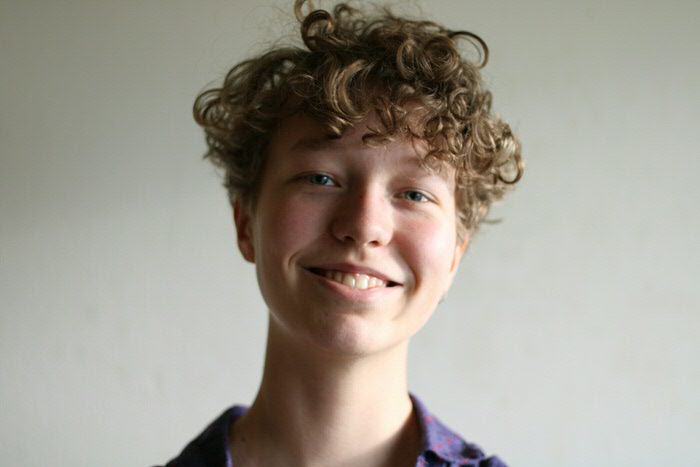
Dag! Ik ben David Lettink, 20 jaar oud, geboren en getogen in Groningen. Op dit moment zit ik in mijn 2e jaar GLTC en als mijn vrije ruimte vak volg ik “From Agamemnon to Alexander,” een vak over Oud-Griekse archeologie. Door GLTC heb ik mijn interesse in archeologie ontdekt en overweeg ik zelfs een carrière in dit vak (natuurlijk in combinatie met Grieks en Latijn). Verder zit ik bij de toneelcommissie van onze studievereniging Boreas, waarbij ik heb meegewerkt aan het vertalen van het script en waar wij dit jaar een opvoering van gaan maken! In mijn vrije tijd ben ik veel bezig met muziek, spreek ik graag met vrienden en familie af en doe ik aan (zeer matig) boulderen.
Ik heb altijd al een interesse in taal en cultuur gehad en op de middelbare school vond ik vooral Latijn een erg leuk vak. Eigenlijk was dit hetgene waar ik het meest enthousiast over werd en dacht ik “waarom niet?” Nu ik eenmaal bezig ben is het mij alleen nog maar duidelijker geworden dat dit is wat ik graag wil doen.
Ik woon al mijn hele leven in Groningen en ik heb het hier altijd erg goed naar mijn zin gehad. Ik heb wel overwogen om naar een andere stad te gaan, maar ik vond het ook erg fijn om in de buurt van familie te blijven. Zelfs al ken je Groningen al zo goed, het is toch nog weer een hele nieuwe ervaring als student!
Op dit moment zit ik er telkens meer over na te denken om naast GLTC meer de archeologie kant op te gaan. Ik vind vooral Bronstijd Griekenland erg interessant, dus wie weet beland ik op Kreta of op een andere interessante plek!
Een studie kan behoorlijk veel werk zijn en dat is in het begin flink schakelen, maar maak je vooral niet te veel zorgen over dingen als ‘wat als iets niet lukt of niet goed komt’: de opleiding zit vol met allemaal heel aardige en meedenkende mensen die klaar staan om je te helpen. Er is altijd iets mogelijk!
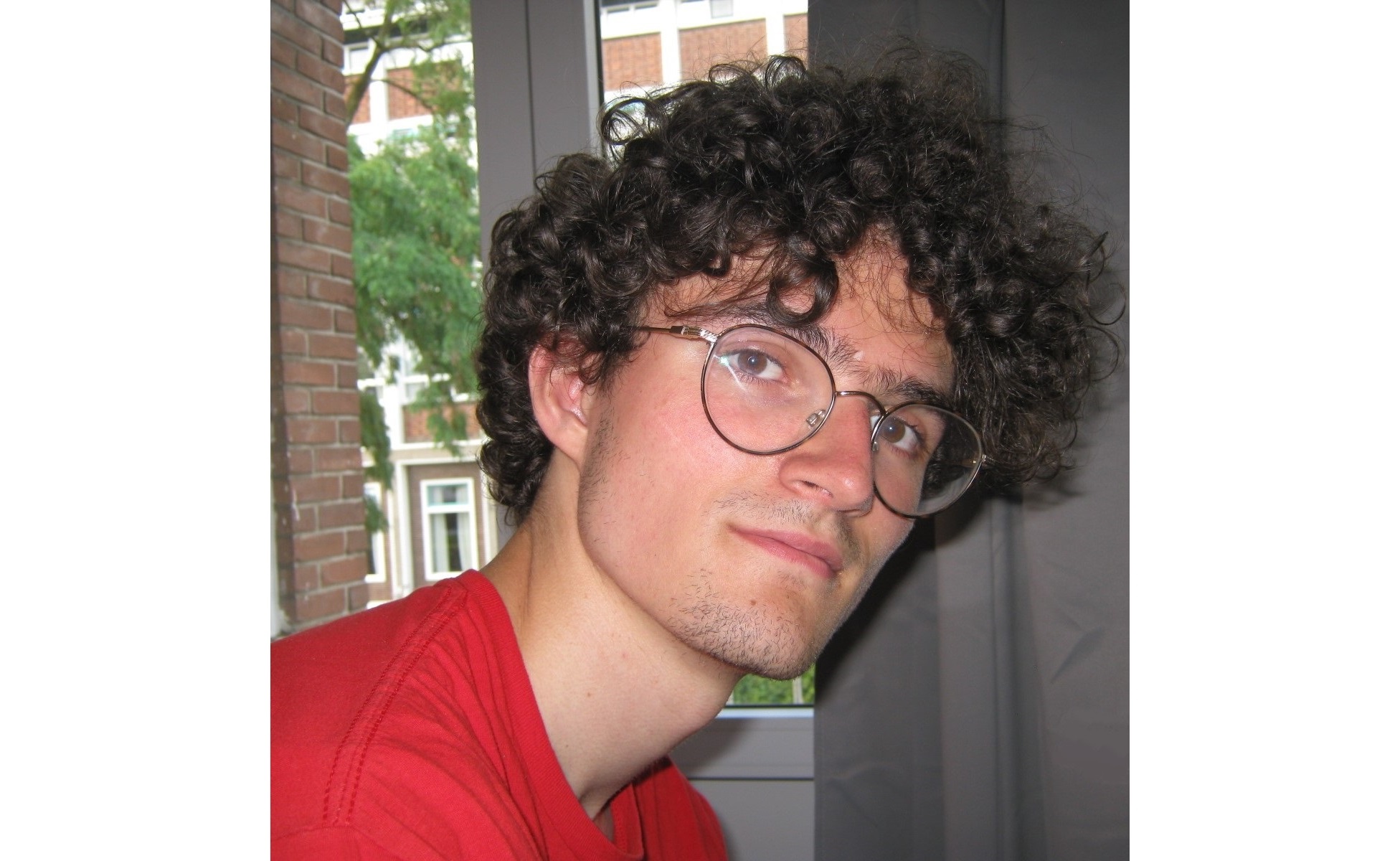
Hoi! Mijn naam is Aymon en ik ben 19 jaar. Ik zit nu in het tweede jaar van mijn bachelor Griekse en Latijnse Taal en Cultuur in Groningen. Als invulling van mijn vrije ruimte volg ik nu een vak over het jodendom bij Religion, Culture and Society. Ik besteed graag tijd aan mijn studie maar verder doe ik ook nog een hoop, zo werk ik achter de bar bij Vera, een poppodium in de stad, en drum ik in een bandje. Ik heb het zo enorm naar m’n zin!
Toen ik Latijn en Grieks kreeg op de middelbare school raakte ik heel erg geïnteresseerd in talen. Van grammatica tot taalgebruik en ook de cultuur waar talen zich in bevinden, ik vond het allemaal ontzettend boeiend. Na een paar jaar middelbare school stond eigenlijk wel vast wat voor studie ik ging doen. Ik ben toen voor de zekerheid nog wel een aantal keer naar een open dag geweest en ik heb ook nog een webklas gevolgd, maar die ervaringen sterkten mijn plannen alleen maar. Ik heb nog geen moment spijt gehad van mijn keuze want op al die dingen die ik vanaf het begin al leuk vond gaan we nu nog dieper in tijdens college dan ik me had kunnen wensen. De studie en de stof zijn gewoon perfect voor mij dus ik ben heel blij dat ik voor GLTC gekozen heb.
Ik ben opgegroeid in Groningen dus van jongs af aan heb ik meegemaakt hoe leuk Groningen voor studenten is. Nu ik zelf student ben heb ik dat nog veel beter door: er is hier voor ieder wat wils, zoveel leuke en diverse plekjes om te studeren en je weg te vinden. Groningen is zo’n leuke stad en je gaat echt een hele leuke tijd hebben als je hier komt studeren!
Eigenlijk ben ik nooit zo met de toekomst en mijn carrière bezig geweest. Veel mensen denken dat je met klassieke talen ook helemaal niet ver kan komen, maar dat is niet zo! Er zijn heel veel plekken waar ze mensen die analytisch nadenken over taal en samenleving goed kunnen gebruiken en waar het ook nog leuk is om te werken. Je komt dus altijd wel ergens terecht waar je het naar je zin zal hebben. Mij lijkt het onderwijs heel leuk. De kennis die ik zelf heb overbrengen aan andere mensen vind ik altijd geweldig. Ik heb nog geen helder carrièreplan, maar ik weet zeker dat ik met Grieks en Latijn ergens ga komen waar ik heel gelukkig word.
Het belangrijkste is dat je gelukkig wordt van wat je doet. Als je Grieks en Latijn interessant vindt, volg je gevoel dan! Aarzel niet want er is zoveel leuks om te leren, zowel binnen als buiten je studie: alles ligt open en de goeie studiekeuze is de basis voor een leuk studentenleven. Dus: aarzel niet om te doen wat je interessant vindt, want daar word je blij van!
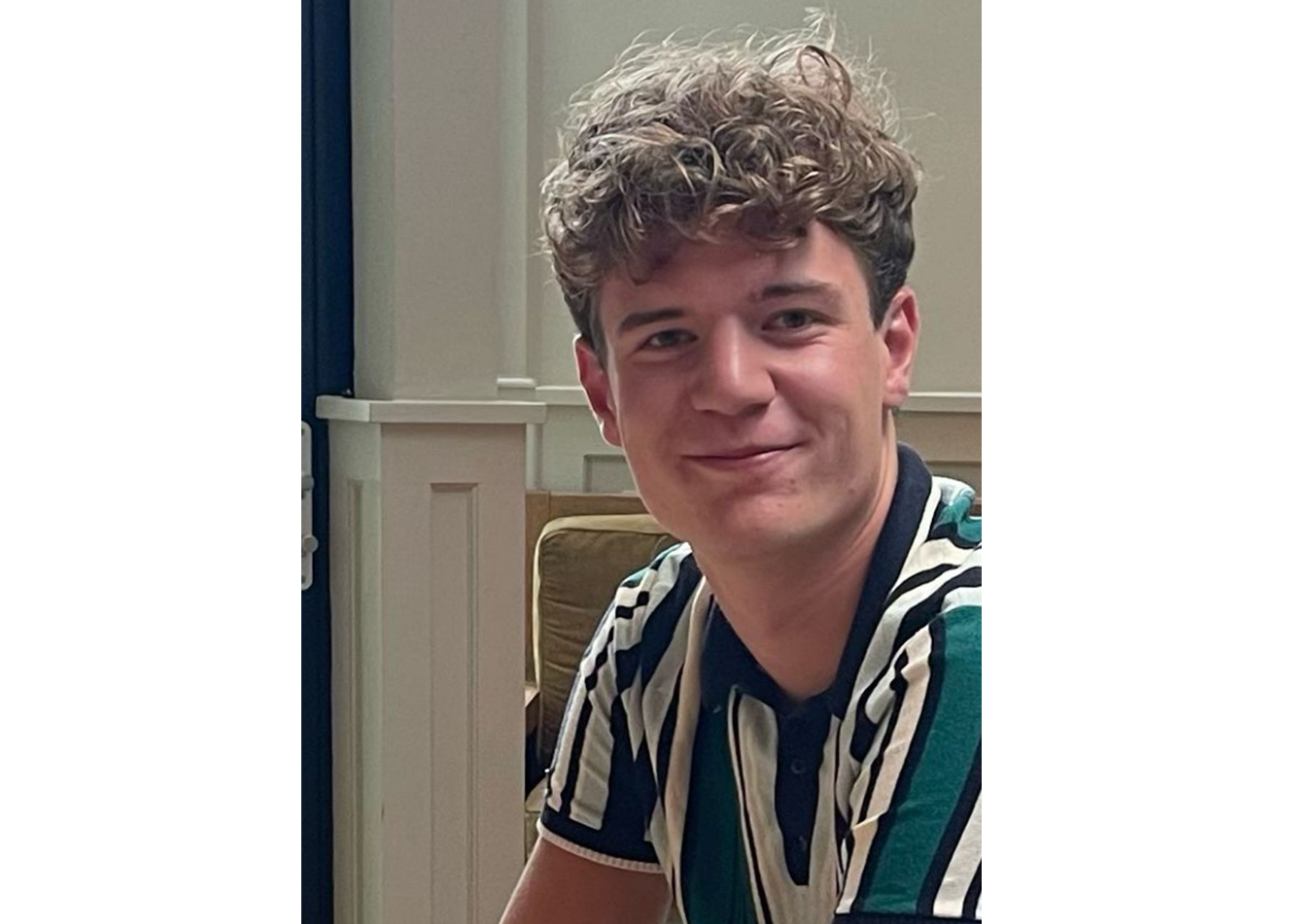
Hoi! Mijn naam is Alec de Jong, ik ben 19 jaar oud en zit in mijn derde jaar Grieks en Latijn. Omdat ik tijdens mijn studie nóg meer ontdekte hoe leuk ik taal vind, ben ik dit jaar ook gestart met de Bachelor Nederlandse taal en cultuur. Ik kom uit Nieuwehorne, Friesland en reis op en neer naar Groningen. Die reis is het wel waard, want de colleges zijn erg gezellig en interessant. Naast mijn studie speel ik korfbal, spreek ik af met vrienden en zoek ik graag dingen uit over de geschiedenis van mijn dorp of mijn familiegeschiedenis.
Al sinds de basisschool heb ik taal, geschiedenis en cultuur
heel erg interessant gevonden. Op het gymnasium merkte ik al dat
Grieks en Latijn méér was dan alleen taal. De filosofie,
kunst, geschiedenis, verhalen en gedichten: ik vond het allemaal
even leuk. Daarnaast kwam ik erachter hoe sterk de klassieke
oudheid de hedendaagse wereld heeft beïnvloed. Tijdens
vakanties, in boeken of gewoon op straat: overal zie je de sporen
van de Latijnse en Griekse cultuur.
Toen de studie mijn interesse gewekt had, heb ik deelgenomen aan de
webklas van GLTC. Dit vond ik al erg leuk. Op de open dag heb ik
ook andere studies bezocht, maar toen ik bij het proefcollege van
Grieks en Latijn zat, was ik verkocht. Eigenlijk werd voor mij
duidelijk dat alle onderdelen van andere studies die ik interessant
vond samenkwamen in deze studie. Na een aantal jaren studeren
ervaar ik deze veelzijdigheid zeker.
Om in Groningen te gaan studeren was voor mij heel logisch. Niet alleen de snelle verbinding met het openbaar vervoer en de locatie spraken mij aan, maar Groningen is ook een heel leuke stad om te studeren.
In de toekomst wil ik me verder gaan verdiepen in het gebruik van talen door de tijden heen, omdat het me leuk lijkt om bij een archief of erfgoedinstelling te gaan werken. Maar misschien ga ik ook wel het onderwijs in, er is namelijk veel mogelijk met een BA GLTC.
Twijfel je nog over je studiekeuze? Doe mee met Open Dagen, Eén Dag Student of de webklas. Op die manier krijg je een goed beeld van de verschillende onderdelen van de studie en merk je meteen of het jou gelukkig maakt.
Een gouden tip voor toekomstige studenten: lees en bekijk alles goed! Dompel je helemaal onder in de stof die je aangeboden wordt en geniet vooral. Dan zul je zien dat je verbanden gaat zien die je eerder nooit zag.
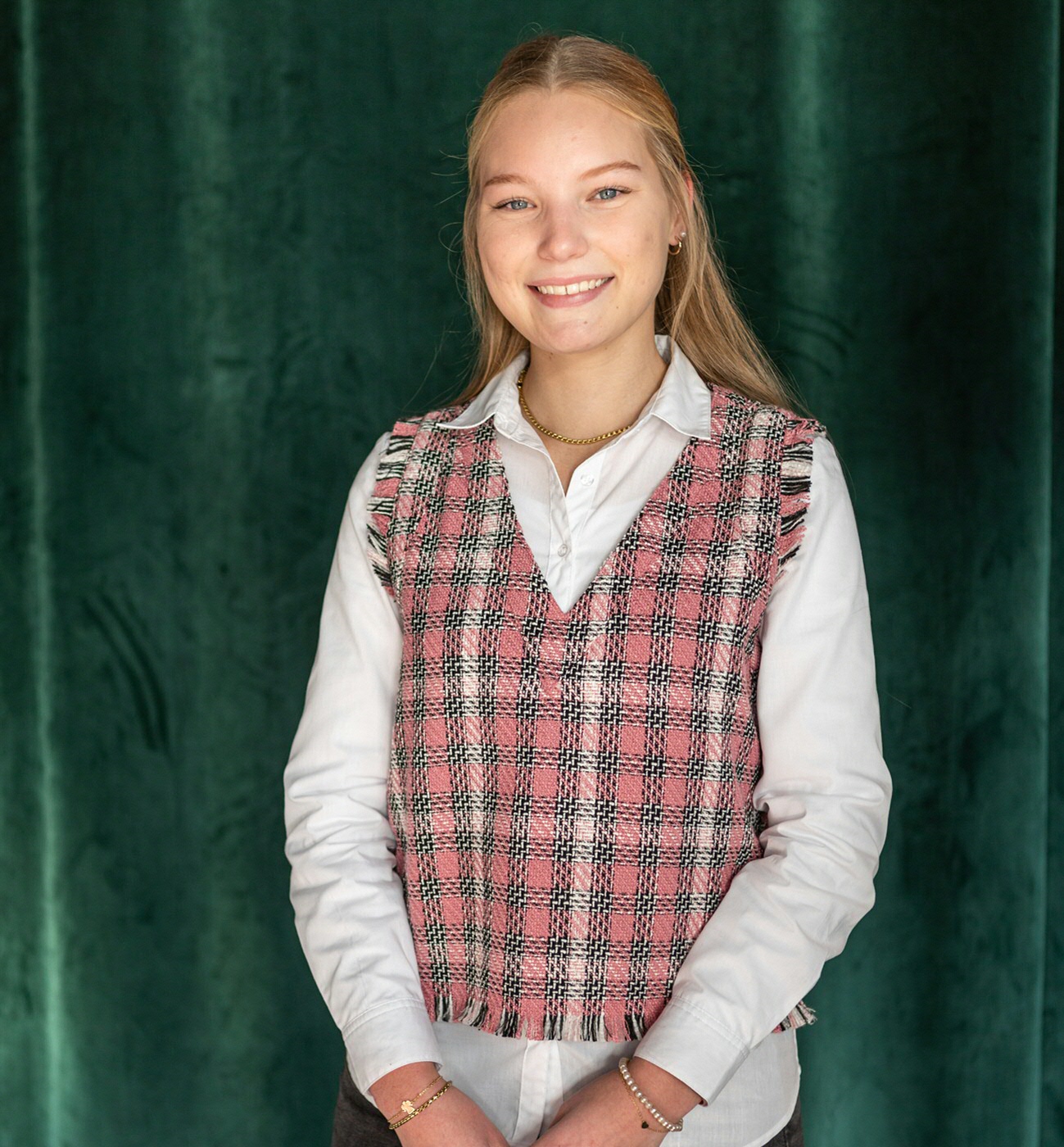
Hoi! Mijn naam is Marilin Jonkman, 21 jaar oud en ik ben nu vierdejaars studente. Ik heb afgelopen jaar de bachelor Griekse en Latijnse Taal en Cultuur afgerond, en dit collegejaar ben ik begonnen met de studie Psychologie. Momenteel ben ik dus geen studente GLTC, maar wel voor het derde jaar studentambassadeur en daarnaast studentassistente bij deze opleiding. Volgend jaar wil ik starten met de Educatieve Master Grieks en Latijn.
Ik woon in Hoogeveen en ik ga op en neer met de trein voor de colleges in de mooie studentenstad Groningen. Naast mijn studie speel ik viool en vind ik het leuk om met vriendinnen af te spreken, te lopen of te fietsen en om andere steden te bezoeken.
Ik heb deze studie gekozen omdat Grieks en Latijn op de middelbare school de vakken waren die mij het meest interesseerden. Dit waren de vakken waar ik naar uitkeek. Bovendien had ik een heel leuke docente, die mij enthousiasmeerde. Met mijn NG/NT-profiel op het gymnasium verbaasde ik veel mensen met mijn studiekeuze. Ik kon alle kanten op, maar ik koos juist voor deze studie en heb er geen moment spijt van gehad. Ik voelde mij hier meteen op mijn plek en heb de vakken als interessant en uitdagend ervaren. Het leukste vind ik het bezig zijn met de talen, die op het eerste gezicht zo anders lijken dan de moderne talen, maar ook zoveel overeenkomsten blijken te vertonen.
Zit je op het vwo en wil je graag weten hoe dat is, studeren? De opleiding Griekse en Latijnse taal en cultuur (GLTC) biedt een webklas aan! Een webklas is een door de RUG gemaakte cursus in Brightspace (een elektronische leeromgeving) voor scholieren uit 5 en 6 vwo. Je kunt in zo'n cursus in tien studielasturen kennismaken met GLTC door teksten te lezen, opdrachten te maken en met elkaar en de docent te discussiëren. Interesse?
Meld je dan aan voor de webklas.